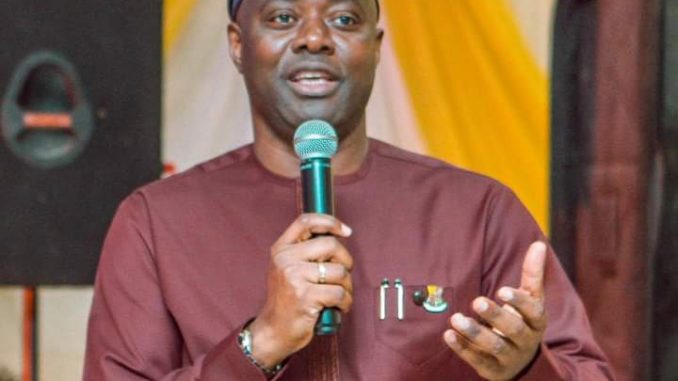
By DAPO FALADE
Governor ‘Seyi Makinde of Oyo State, on Thursday, inaugurated the state Steering Committee on COVID-19 Action Recovery and Economic Stimulus Programme (State CARES), an initiative targeted at mitigating the effects of the pandemic on the state.
The governor, while inaugurating members of the nine-man steering committee at the Governor’s Office, said the programme was meant for post-COVID-19 economic recovery.
Makinde, in a statement by his Chief Press Secretary, Mr. Taiwo Adisa, explained that the programme will focus on three major areas, including expanding access to livelihood support, food security services and grants for the poor and vulnerable households and firms in the state.
He said: “We are here to inaugurate the CARES programme for Oyo State. The programme is aimed at mitigating the damage caused by the COVID-19 pandemic.
“So, it is about post-COVID-19 economic recovery and we are looking at three major areas. We want to increase access to basic services such as health care.
“We want to take care of the poor and the vulnerable households within the state and we also want to strengthen the food supply chain for the poor households, because we know that once we are able to tackle hunger, people are able to think correctly.”
The governor also said his administration had begun to cushion the effects of the COVID-19 pandemic in the state since last year, as it has provided palliatives to the poor and vulnerable households as well as farmers in all the nooks and crannies of the state.
He added that the state was able to distribute farm inputs to farmers to increase food production and ensure food security post-COVID-19.
“We also want to support the MSMEs to navigate this difficult time. We already started taking this action since last year with the distribution of palliatives to the poor and vulnerable households. We also distributed farm inputs to farmers in the state to increase food production.
“We came up with the N1 billion MSME fund to provide credit at a single-digit interest rate to MSMEs in the state and, while I was comparing a note with the focal point for that, the Director-General of the Oyo State Investment Promotion Agency (OYSIPA) told me that about N500 million had been disbursed already and that they still have other applications. So, we have been doing most of these things.
“The programme is not just a grant or giving money to us. It is a programme for results. So, we have to spend the money first and the World Bank will have to confirm that we have spent the money on those things that we said we are going to spend the money on.
“With this, we can even do more apart from what we have been doing on our own to help our economy recover from the effect of COVID-19 and the economic meltdown occasioned by the drop in oil prices, which have been affecting the federal allocation coming to the state,” he said.
Speaking earlier, the state’s Commissioner for Finance, Mr. Akinola Ojo, stated that the CARES Programme is a World Bank-assisted programme for results, with the sum of $750 million already earmarked by the Bank to support the 36 states of the federation and the FCT.
“This P for R, which is the programme for results, initiative is aimed at mitigating the devastating effect of the coronavirus pandemic on the livelihood of the poor, vulnerable households amongst us as well as to help cushion the effects of this pandemic on the economic activities of the respective states.
“The objective of the programme is to basically expand access to livelihood support, food security services, grants for the poor, vulnerable households and organisations,” he said.
He added that the objective of the programme will be measured, using free-result indicators, including the number of beneficiaries targeted, who have access to basic social services, the number of farmers supported to increase food production and a number of vulnerable and viable firms supported by the programmes.
Akinola further said the programme similarly outlines a two-year financial support to the state to fulfill programme development objectives in three key areas.
These areas, he said, are cash transfers and livelihood support to poor and vulnerable households, increasing food security and safe functioning of food supply chain for the poor households and facilitating the recovery of Medium and Small Scale Enterprises.

Leave a Reply